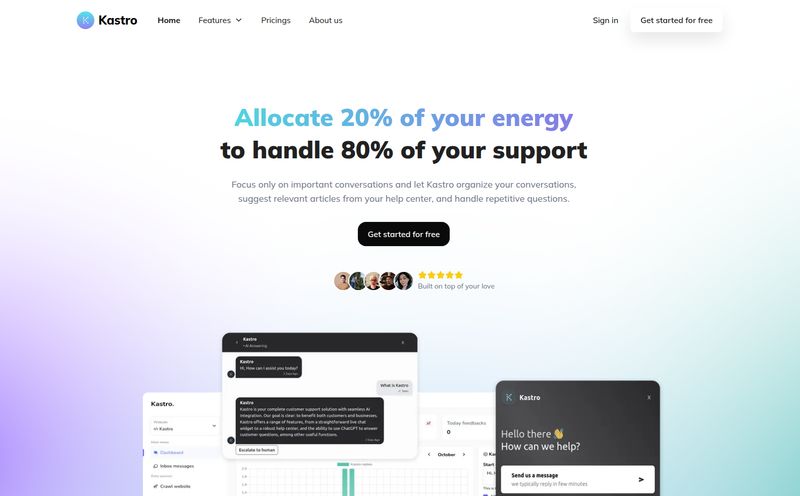We’re all professionals here, but a well-placed emoji can make or break a Slack message. It can soften a critique, celebrate a win, or just perfectly capture that ‘it’s only Tuesday but feels like Friday’ mood. But finding the right one on a Mac? Ugh. It can feel like a chore.
You type 'celebrate' and get... a confetti ball. Okay. But where's the party popper? The dancing ladies? The little guy in the party hat? The default macOS emoji picker is, to put it kindly, a bit literal. It's functional, sure, in the same way a spork is functional. It gets the job done, but nobody's winning any design awards. For years, I’ve just accepted this as my fate. A minor, daily frustration. Then I stumbled upon Emojibu, and I have to say, it’s changed my entire emoji game.
So, What Exactly is Emojibu?
Emojibu isn't trying to reinvent the wheel. It's just making the wheel a whole lot smarter. At its heart, it’s a replacement emoji picker for macOS. But calling it just a 'picker' feels like a disservice. It's more like a supercharged emoji search engine that lives in your menu bar, powered by some surprisingly clever tech that actually understands how humans—not robots—think about emojis.
The Frustrating Art of Emoji Search
My biggest gripe with the standard Mac emoji window has always been the search. I have to know the exact official name for an emoji, or a very close keyword, to find it. I can't just type 'sad cowboy' and expect to see 🤠. I can't type 'money face' and get 🤑. It lacks intuition. It doesn’t understand slang, context, or the weird little nicknames we all have for our favorite yellow faces. This friction, this tiny moment of thought-interruption, pulls you out of your flow. And when your job involves a lot of communication, those little interruptions add up.
How Emojibu Is Fixing Search with a Dash of AI
This is where Emojibu really shines, and honestly, the reason I felt compelled to write about it. It uses GPT-4 to power its search synonyms. Now, I know what you’re thinking—'AI' is the marketing buzzword of the decade. But here, it's not just a gimmick. It’s genuinely useful.
Synonyms That Actually Make Sense
Because it's using a language model, the search is far more conceptual. You can type 'launch' and it knows you probably want the rocket emoji 🚀. You can type 'oops' and it might suggest the facepalm 🤦 or the wide-eyed face 😳. It even understands multiple languages, so your brain doesn't have to switch gears if you're bilingual. It's a small change that feels massive in practice. It’s less like searching a database and more like asking a friend, "Hey, you know that emoji that looks like my brain is exploding?"
Finally, You Can Personalize Your Search
This is my favorite feature. Emojibu lets you add your own custom synonyms. For the longest time, whenever I wanted the grimacing face emoji (😬), I would instinctively type 'yikes'. The default picker would just stare back at me, blankly. With Emojibu, I took ten seconds to add 'yikes' as a custom synonym for 😬. Problem solved. Forever. You can build your own private emoji dictionary based on your own slang, inside jokes, and brain patterns. Its a small thing, but it feels incredibly personal and powerful.

Visit Emojibu
More Than Just a Pretty Search Bar
While the search is the main event, there are a couple of other neat tricks up Emojibu's sleeve.
One of the most creative additions is emoji combinations. Emojibu has over a thousand pre-built emoji stories or combos. It’s a bit of fun, but it can also be a neat way to express a more complex idea without words. Think of it as having a little emoji artist on standby, ready to create a tiny visual gag for you.
It also handles multiple word searches beautifully. If you search for something like "sad cat," it opens two tabs: one for 'sad' results and one for 'cat' results. This is a subtle but brilliant quality-of-life improvement that streamlines finding exactly what you’re looking for without having to start your search over. It’s clear this tool was built by someone who was genuinely frustrated with the existing options.
The Price Tag is a Breath of Fresh Air
In a world dominated by SaaS subscriptions that slowly bleed our bank accounts dry, Emojibu’s pricing is a sight for sore eyes. It's a one-time purchase. You pay once, and you get it forever, including all future updates. As of this writing, it’s on sale for a price that’s less than two fancy lattes.
| Plan | Price | Details |
|---|---|---|
| Emojibu | $10 (Normally $20) | One-time purchase with all features and lifetime updates. |
I have a huge appreciation for this model. It shows confidence in the product. The developers aren’t trying to lock you into a monthly fee; they’re just selling you a good tool for a fair price. More of this, please.
Okay, What's The Catch?
No tool is perfect for everyone, and Emojibu has a couple of very specific limitations. First, it's macOS only. Windows and Linux users, you're out of luck on this one. Second, and this is the bigger one, it requires a fairly modern Mac. You need to be running macOS 13.0 (Ventura) or later, and your Mac needs to have an Apple Silicon chip (M1, M2, M3, etc.). If you're still running an Intel-based Mac or an older OS, this won't work for you. For many, this is a non-issue, but it’s a hard gate for those with older hardware.
My Final Verdict: Is Emojibu Worth Your $10?
If you're a heavy Mac user who communicates a lot—whether you're a social media manager, a team lead living in Slack, a writer, or just someone who enjoys expressive digital communication—then yes. Absolutely. Without a doubt.
It's one of those small, inexpensive utilities that provides a surprising amount of daily value. It removes a point of friction I didn't even fully realize was draining my energy until it was gone. It makes my workflow smoother and, dare I say, a little more joyful. For the price of a sandwich, you get a tool that genuinely improves a task you probably do dozens of times a day. For me, that’s a no-brainer.
Frequently Asked Questions About Emojibu
I've seen a few questions pop up, so let's tackle them head-on.
What are the exact system requirements for Emojibu?
You'll need a Mac with an Apple M1 chip or later, running macOS 13.0 or a newer version. It is not compatible with Intel-based Macs.
How does the GPT-4 synonym feature actually work?
It uses the AI model to understand the context and intent behind your search query, not just the literal words. This allows it to connect slang, concepts, and indirect descriptions to relevant emojis, giving you much better results than simple keyword matching.
Can I use Emojibu if I'm offline?
Yes. According to their site, the core features work offline. The initial setup and some AI-powered features might require an internet connection, but your day-to-day searching and custom synonyms should work perfectly without one.
Is it really a one-time purchase, or are there hidden fees?
It's legit! The website is clear: you pay once and get all current features and future updates. No subscriptions, no in-app purchases for core functionality.
What if I buy it and I don't like it?
The site mentions a full refund if you're not satisfied, with no questions asked. This shows they stand behind their product, which is always a good sign.
A Small Tool That Sparks Joy
It might seem silly to get this excited about an emoji picker. But in the world of SEO and digital marketing, efficiency and clear communication are everything. Emojibu is a beautifully simple tool that polishes a small, rough edge of my digital life. It saves me time, makes me smile with its clever combos, and just works the way I wish it always had. And for ten bucks? That’s one of the best investments in my daily workflow I’ve made all year.



